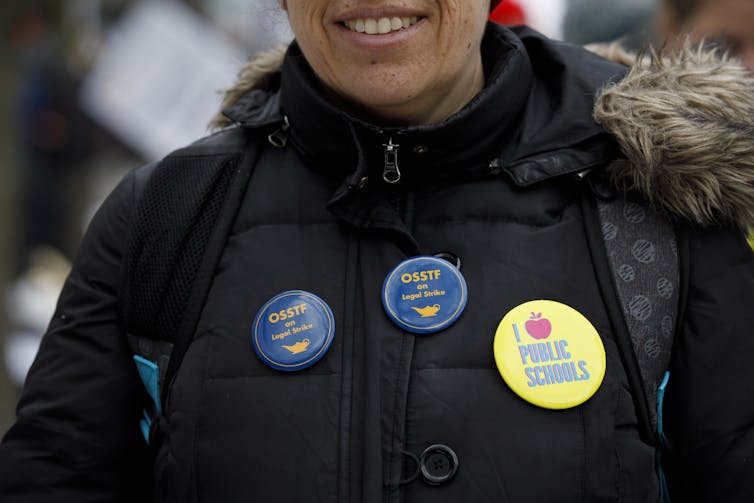
Charles Ungerleider, University of British Columbia

Curious Kids is a series for children of all ages. Have a question you’d like an expert to answer? Send it to This email address is being protected from spambots. You need JavaScript enabled to view it..
Do teachers get paid when they go on strike? — Zara, 10, Toronto.
Many people are confused about whether teachers get paid their salaries during a strike. The short answer is that they don’t.
But striking teachers often receive a bit of financial help during a strike from money they themselves have already paid to their unions. In other words, teachers are paying themselves when they strike.
On strike
When employees strike they refuse to perform their normal duties because they have a strong complaint about how the employer is treating them.
The employer, in this case, is the school board — a group of schools in a particular region.
Teachers may be striking because the school board wants to put more students in the classes they teach, or teachers feel the school board is not paying them enough money for their work.
In other words, a strike is a sacrifice that teachers make today to improve things tomorrow.
How can you pay yourself?
When teachers get paid for their work, a very small portion of the money they earned goes into what’s called a teachers’ union — a big group of teachers who share common professional interests.
My involvement with unions has shown me that negotiating as a group of workers (a union) with an employer (a school board, for example) for wages, working conditions and benefits protects individual workers from being treated unfairly by an employer.
I was a union member when I was a teacher and when I’ve held other jobs. Then as a school trustee, I was an employer (representing a school board) that negotiated with teacher unions.
The money teachers pay toward their union is called union dues or membership dues and this money is used to pay for many things.

These dues pay salaries of the union officials who organize teacher meetings or who arrange the professional learning teachers do when students stay home on a professional development (P.D.) or professional association (P.A.) days.
They support teachers in many other ways too, like representing teachers in negotiations with their employers, the school boards, if either teachers or the school boards want to change the terms of employment.
A portion of the dues a teacher pays to her or his union also goes into a bank account in case of a strike.
Agreeing on work conditions
The process for making decisions about wages (the money teachers make), working conditions and benefits is called collective bargaining.
Collective bargaining is a negotiation between the union representing teachers and a representative of the school board. In some cases, such as in Ontario, there could be provincewide bargaining legislation, which means that the position of the province’s ministry of education is the position that school boards are required to take into discussions.
When the union and employer come to an agreement, they enter those decisions in a document called a collective agreement. When an agreement cannot be reached, both the employer and the union have tools they can use.
The employer can prevent teachers from working and earning their wages by locking them out of the school. The union can strike.
No regular work, no pay
When teachers strike, they are refusing to perform their regular assigned work, and they don’t receive their pay from their employer.
Instead their union often pays them a small amount of money (about $50 to $100 each day) so that they can pay some of their normal expenses, like rent, food and transportation.
This money comes from the union’s strike account. The payment from the strike account comes from the membership dues the teachers pay each month.
Hello, curious kids! Do you have a question you’d like an expert to answer? Ask an adult to send your question to This email address is being protected from spambots. You need JavaScript enabled to view it.. Please tell us your name, age and the city where you live.
And since curiosity has no age limit — adults, let us know what you’re wondering, too. We won’t be able to answer every question, but we will do our best.
[Deep knowledge, daily. Sign up for The Conversation’s newsletter.]![]()
Charles Ungerleider, Professor Emeritus of Educational Studies, University of British Columbia
This article is republished from The Conversation under a Creative Commons license. Read the original article.


